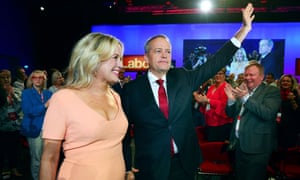Extract from The Guardian
The Labor leader’s pitch spoke directly to voters most at risk of peeling off and voting for One Nation or other populists
He’s hinted at it before,
but Bill Shorten took the opportunity of Labor’s national conference to
be explicit in front of the party faithful in Adelaide.
The opponent for the next federal election was not so much Scott Morrison (relegated a few minutes earlier as a “grinning fool in a baseball cap” by the new party president, Wayne Swan), or Pauline Hanson, or the Greens, it was voter disaffection – “distrust and disengagement, scepticism and cynicism”.
Identifying the real opponent was a streamlining exercise. It removed the detritus from the Labor leader’s opening pitch.
Shorten’s pitch on Sunday was squarely to working Australians, people
angry enough with the political and economic status quo to contemplate
voting “other” at the next federal election, because that’s the current
electoral contest. That’s the fight the major parties are in, and it’s
an existential one.The opponent for the next federal election was not so much Scott Morrison (relegated a few minutes earlier as a “grinning fool in a baseball cap” by the new party president, Wayne Swan), or Pauline Hanson, or the Greens, it was voter disaffection – “distrust and disengagement, scepticism and cynicism”.
Identifying the real opponent was a streamlining exercise. It removed the detritus from the Labor leader’s opening pitch.
The Labor leader’s message to the voters was we’ve got your back. We’ve got an economic agenda that will further your material interests, investments in education and technical training, superannuation, affordable housing, universal healthcare and a fairer workplace relations system for people without bargaining power.
Part of this was standard national conference management. Shorten needs cooperation from union leaders through the next three days in Adelaide to avoid any politically inconvenient confrontations on the floor, so base-whispering and courtship is to be expected.
But Sunday’s pitch was about more than massaging the comrades. It was about speaking directly to voters who are currently most at risk of peeling off and voting for others – One Nation, or other populist independents likely to present themselves between now and polling day, peddling nativism, hunting for scapegoats.
All year, in every electoral contest, and the section 44 fracas has bowled up so many of them, Labor has pursued a strategy to boost its primary vote, adjusting the dials to suit the local conditions. Throughout Sunday’s pitch to be prime minister, Shorten kept his eyes trained on the flight risks.
The hat tips to Labor’s progressive, post-material constituency were certainly there but kept to a minimum. When progressive preoccupations featured – like climate change – they were refracted through a materialist lens.
A booming renewables sector meant Australian jobs, and manufactured products. Batteries, Shorten reflected at one point, were the “bridge that turns renewable energy into the conservative solution”, and they could be made in Australia, given we possessed all the necessary raw materials.
When the post-material constituency forced themselves on Sunday’s proceedings, as anti-Adani protesters stormed the stage and rallied in significant numbers outside the event, Shorten wondered, just who were they helping? A progressive alternative government, or the conservative one clinging on in Canberra, creaky and nervy enough to want to upstage Labor’s big day out with the big reveal of a new governor general.
Shorten’s argument on Sunday was about rebuilding for a purpose.
Rebuilding the fundamentals of the fair go, be it in economic or social policy, was the antidote to the all-pervasive uncertainty; the uncertainty here, and the anxiety that has been fixed since the global financial crisis, roiling and fracturing democracies around the world.
He posited that if that bedrock could be rebuilt, Australia did not need to be a “a nation constantly fearful of the world around us”.
If distribution in Australia was fair, and seen to be fair, we could be big enough to reconcile with the first Australians, big enough to be multicultural and not retreat from that identity, big enough to be a republic, at home in Asia and the Pacific, confident enough to look outwards.
Shorten is not popular with voters. He doesn’t have the luxury of presenting himself as a messiah figure. What he has is his own dogged persistence, a cause, an institution that is intent on lining up behind him – a fighting force that can be rallied and wants to be rallied.
Mark Latham once presented to a Labor conference as a new sensation, a presidential hubris that flared and flamed out. Sunday wasn’t about Shorten. The leader was recessed into the institutional objective, which was the return of an old-school Labor government to Canberra in 2019.
Australia needed a Labor government, Shorten said, to preserve basic Australian values and to “build a fairer future”.
Shorten proposed himself as a leader with the humility to understand the anger of the people. He was the leader of a political movement that kept turning up, and turning up to expand the country rather than profit from divisions.
“We are united, we are determined and we are ready, ready to serve, ready to lead, ready to deliver a fair go for Australia,” Shorten said in conclusion – hoping with all his being that it was actually true.

No comments:
Post a Comment